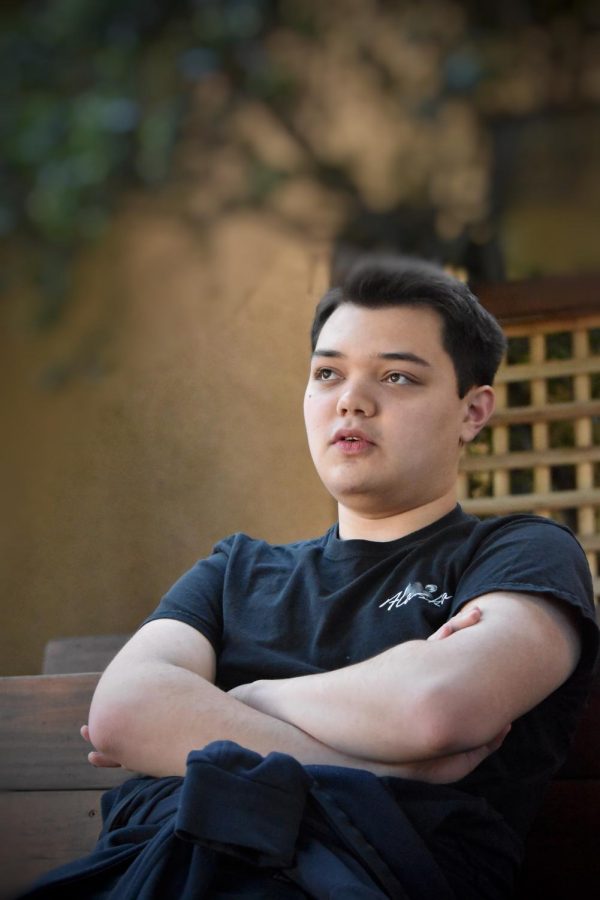Humans of Harker: A philosophical understanding
Quentin Clark (12) analyzes the world around him by implementing thought
“Artificial intelligence could be used in a peaceful way that ensures humanity prospering, or it could be used in a way that will accidentally make killer robots that will eat the planet. You laugh a little bit, but it is a somewhat legitimate risk. I genuinely think that the only way we will be able to respond to these challenges is by students having a better basis in philosophy because having a robust philosophical background based on a diverse set of fields gives us the broader understanding to recognize what impacts our technology will have,” Quentin Clark (12) said.
He sits on a bench, looking into the distance, quietly observing the scenery around him and toying with fascinating ideas running through his mind. With his arms crossed and a pensive look in his eyes, thoughts flit through his head as he examines the world around him, understanding the way of life using philosophies and reason.
Whether in debate or robotics, Quentin Clark (12) always tries to implement his philosophies and express his opinions rationally. An avid debater, Quentin participated in the policy and Lincoln-Douglas events. Quentin credits his interest in philosophy to debate, appreciating the diverse perspectives and fresh ideas that arise during intense debates.
“Debate has opened me up to new perspectives on how to understand and process the world. It also helps explain how our engagement with the world affects our own politics, how it affects the politics of others around us, and how all those coincide with different competing theories of the world,” Quentin said.
From debate, Quentin learned that issues contain many facets and cannot be classified into one overarching theory. Quentin finds many debate topics such as military aid and standardized testing intriguing as they contain moral and ethical issues that can be argued profusely.
“The style of debate that Quentin does often involves philosophical questions. His passion for philosophy really infuses the way that he approaches debate. He also knows when to separate philosophical questions from practical questions too,” Greg Achten, the speech and debate coach said. “The thing that impresses me the most about Quentin is his perseverance. He takes it as a challenge as opposed to a setback when he doesn’t do well. He has a very positive attitude that serves him well and has stuck with debate even when there are challenges.”
In addition to contemplating how major events affect the world, Quentin is also aware of the impacts that his actions have on people. Quentin is understanding in his interactions with other people, recognizing that everyone is in a unique situation and should be treated with respect.
“I try to be mindful about things, in terms of how I act in certain situations. In general, I try to be as kind to people as possible, and I try to understand that people’s lives have challenges that I am unable to perceive,” Quentin said. “To me, trying to criticize or make light of other people’s problems does not seem to be very productive.”
Quentin utilizes these skills when spending time with his friends. Despite his aptitude for philosophy and intellectual conversation, Quentin also enjoys having fun with his friends. He is also a part of many teams and has learned how to cooperate and work effectively.
“Quentin and I collaborate a lot on improving our arguments for debate. From his meme recommendations to his jokes, I’ve learned that Quentin is a funny person and has a good sense of humor. He’s also really intelligent and observant, especially in his STEM courses,” said Akshay Manglik (11), Quentin’s close friend from middle school and co-captain of the Lincoln-Douglas debate team.
As the captain of the electrical engineering team in robotics, Quentin has become a mentor to the newest members of robotics. A member of robotics for four years, he has accumulated technical and conceptual knowledge that distinguishes himself from the other team members.
“We talked a lot about robotics and he taught me how everything worked. Even though we are both electrical engineering captains, he has been on the team for two more years than me and I still have to ask him for help sometimes,” said Ethan Cao (10), Quentin’s co-captain of the electrical engineering team. “At first I saw him as any other member of the team, but later I learned that he was very knowledgeable and he knew some things that even the captains at the time didn’t know.”
Through robotics, the importance of philosophy in the technological world has become clear to Quentin. He explains that understanding the ethical impacts of technology will help improve the impacts of more advanced technology in the future.
“Artificial intelligence could be used in a peaceful way that ensures humanity prospering, or it could be used in a way that will accidentally make killer robots that will eat the planet. You laugh a little bit, but it is a somewhat legitimate risk,” Quentin said. “I genuinely think that the only way we will be able to respond to these challenges is by students having a better basis in philosophy because having a robust philosophical background based on a diverse set of fields gives us the broader understanding to recognize what impacts our technology will have.”

Muthu Panchanatham (12) is the opinion editor of Harker Aquila and The Winged Post, and this is his fourth year on staff. This year, he is excited to cover...


















![“[Building nerf blasters] became this outlet of creativity for me that hasn't been matched by anything else. The process [of] making a build complete to your desire is such a painstakingly difficult process, but I've had to learn from [the skills needed from] soldering to proper painting. There's so many different options for everything, if you think about it, it exists. The best part is [that] if it doesn't exist, you can build it yourself," Ishaan Parate said.](https://harkeraquila.com/wp-content/uploads/2022/08/DSC_8149-900x604.jpg)




![“When I came into high school, I was ready to be a follower. But DECA was a game changer for me. It helped me overcome my fear of public speaking, and it's played such a major role in who I've become today. To be able to successfully lead a chapter of 150 students, an officer team and be one of the upperclassmen I once really admired is something I'm [really] proud of,” Anvitha Tummala ('21) said.](https://harkeraquila.com/wp-content/uploads/2021/07/Screen-Shot-2021-07-25-at-9.50.05-AM-900x594.png)







![“I think getting up in the morning and having a sense of purpose [is exciting]. I think without a certain amount of drive, life is kind of obsolete and mundane, and I think having that every single day is what makes each day unique and kind of makes life exciting,” Neymika Jain (12) said.](https://harkeraquila.com/wp-content/uploads/2017/06/Screen-Shot-2017-06-03-at-4.54.16-PM.png)








![“My slogan is ‘slow feet, don’t eat, and I’m hungry.’ You need to run fast to get where you are–you aren't going to get those championships if you aren't fast,” Angel Cervantes (12) said. “I want to do well in school on my tests and in track and win championships for my team. I live by that, [and] I can do that anywhere: in the classroom or on the field.”](https://harkeraquila.com/wp-content/uploads/2018/06/DSC5146-900x601.jpg)
![“[Volleyball has] taught me how to fall correctly, and another thing it taught is that you don’t have to be the best at something to be good at it. If you just hit the ball in a smart way, then it still scores points and you’re good at it. You could be a background player and still make a much bigger impact on the team than you would think,” Anya Gert (’20) said.](https://harkeraquila.com/wp-content/uploads/2020/06/AnnaGert_JinTuan_HoHPhotoEdited-600x900.jpeg)

![“I'm not nearly there yet, but [my confidence has] definitely been getting better since I was pretty shy and timid coming into Harker my freshman year. I know that there's a lot of people that are really confident in what they do, and I really admire them. Everyone's so driven and that has really pushed me to kind of try to find my own place in high school and be more confident,” Alyssa Huang (’20) said.](https://harkeraquila.com/wp-content/uploads/2020/06/AlyssaHuang_EmilyChen_HoHPhoto-900x749.jpeg)



